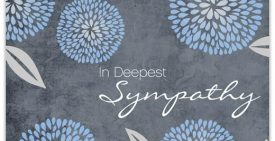
Grief is the great leveler and has the uncanny ability to both bring communities together and highlight what is broken. Now is the time for change.
Following the death of a loved one, Americans have no legal protections outside of narrow exceptions. Need time to organize your affairs after your loved one dies? Find a place to live, freeze credit cards, transfer car titles and mortgages and leases – and perhaps even need to travel to do all of it – all while you’re reeling from grief? You could be fired if your employer doesn’t agree that these tasks aren’t as important as planning a funeral.
At the moment, the Biden administration is planning its legislative agenda. We believe there is a small window in which job protections during the first stages of bereavement can be considered along with other measures such as paid maternity leave. Unpaid leave is far from enough. We need to do more to support people who have lost a loved one to Covid-19, drug use, suicide, gun violence, and more. But it is a start.
Modern Loss; Evermore, a non-profit advocating on behalf of bereaved families; and the below grief organizations, practitioners and companies believe there is no reason the United States shouldn’t have the most advanced bereavement care system in the world. Here is our open letter to President Biden. Additionally, Evermore has a public petition to establish the first-ever Office of Bereavement Care in the White House. If you would like to add your name, please do so here.
President Joseph R. Biden, Jr.
The White House
1600 Pennsylvania Avenue, N.W.
Washington, DC 20500
April 13, 2021
Dear Mr. President,
Thank you for your service and leadership to our country.
On behalf of bereaved families throughout America, we request you safeguard American families by including bereavement leave as part of your agenda to expand family leave benefits and protections.
As the nation confronts concurrent mortality tragedies, employment protection for the newly bereaved has never been more important. Bereavement leave is job protection and millions of Americans who have lost a loved one have no legal right to take leave, with narrow exceptions in two states and two localities. Currently, bereavement is not acceptable grounds for taking unpaid leave under the Family Medical Leave Act, except for miscarriage or stillbirth losses or when a solider is killed in action. This chasm not only leaves millions of Americans at risk for losing their job, but also can be a precipitating event that can send an individual or family into poverty, homelessness and other dire outcomes that can alter a person’s life trajectory permanently.
Job protections for the newly bereaved may include the following:
- Leave: Ten days of unpaid leave following the death of a family member or loved one.
- Age of a child: Define the age of a child up to age 26 bringing age parity with existing health care and tax law.
- Definition of a family member or loved one: While there is no one standard, proposed or passed state laws define a family member or loved one as: (1) Spouses, domestic partners, and both different-sex and same-sex significant others: or (2) Any other family member within the second degree of consanguinity or affinity: or (3) A member of the covered employee’s household, including a minor’s parents, regardless of the sex or gender of either parent. Most laws liberally define parenthood as legal parents, foster parents, same-sex parent, stepparents, those serving in loco parentis, and other persons operating in caretaker roles.
Make no mistake employment protection is not simply about planning a funeral or grieving. Maintaining family stability and solvency in the short- and long-term can be a challenge, especially when families face housing, food and other insecurities. Further, Jewish and Native American traditions, for example, have cultural and religious requirements or norms that must be carried out within specific timeframes. The threat of losing your job under these conditions is unacceptable.
The unexpected death of a loved one is the most common traumatic experience Americans report; many report their loss as their worst life experience.[i] Today, more than 5 million families have lost a loved one due to COVID-19 in the United States, including an estimated 40,000 newly bereaved children who have lost a parent.[ii] Millions more are bereaved from deaths due to overdoses, suicide, mass murder events, homicide, transportation fatalities, and other tragedies that never make our nation’s headlines. The impact of bereavement on American lives is both stunning and underappreciated. Consider the following:[iii]
- Bereaved children are at-risk of school failures, juvenile justice incarceration, drug abuse, violent crime involvement, suicide attempts, suicide, and premature death.
- Bereaved siblings are at-risk of dropping out of school, teen pregnancy, and premature death.
- Bereaved parents are at heightened risk for depressive symptoms, poorer well-being, less purpose in life, more health complications, marital disruption, psychiatric hospitalization, cancer incidence, dementia, and premature death.
- Bereaved spouses at risk of depression, post-traumatic stress, prolonged grief and premature death.
Racial inequalities are magnified across the life course as Black Americans are more likely to experience the death of children, spouses, siblings and parents when compared to white Americans. They are three times as likely as white Americans to have two or more family members die by the time they reach the age of 30.[iv]
Bereavement leave is not an academic exercise. Real families are behind these statistics.
Today, families are left to fend for themselves and without any legal protections. Losing a loved one is more than an emotional hardship, it is an urgent threat to their family wellbeing and economic resiliency. If bereavement leave is not considered now, it will be years before Congress will reconsider codifying employment protections into law.
As the nation’s highest office, we ask that you provide job protection to America’s newly bereaved families. No other time in history has this been more urgent. The cost of inaction is incalculable.
We look forward to working with you and your administration.
Sincerely,
1st Breath
2 Degrees Foundation
A Sacred Passing Death Midwifery and Community Education
Adam’s House
Advocates for Victims of Impaired/Distracted Driving
Alana Rose Foundation
Alive Alone, Inc.
Alive Hospice
Altarum
American Association for Psychoanalysis in Clinical Social Work
Angel Eyes
AnnaLeah & Mary for Truck Safety
Ashlie’s Embrace
Association for Ambulatory Behavioral Healthcare
Austin Center for Grief & Loss
Banister Advisors, LLC
Bereaved Parents of Madison, Inc. Madison, WI
Better Not Bitter Mom LLC
Casey Feldman Foundation
Center for Alternatives in Community Justice
Center for Complicated Grief
Children’s Grief Center of New Mexico
Children’s Bereavement Center of South Texas
Coalition of Concerned Mothers
Conor Lynch Foundation
COPE, New York
Counseling Program, Marshall University
COVID Survivors for Change
Dane County, County Executive, Joe Parisi
Empowered NICU Parenting
Erin’s House for Grieving Children
Evans Team
Evermore
Families for Safe Streets
Farley-Kluger Initiative
Feldman Mortuary
Florida SADD
Florida Teen Safe Driving Coalition
Forneret Co.
Friends of Aine
FRIENDS WAY
Give InKind
Gold Star Parents Retreat
Grief Coach
Grief Resource Center
Hang Up And Drive
Healthy Mothers, Healthy Babies – The Montana Coalition
Hope and Healing of Pinellas
HOPE Connection, Los Angeles
Infant Death Center of Wisconsin
Institute for Safer Trucking
Journey Through Bereavement
Judi’s House
Lantern, PBC
Louis D. Brown Peace Institute
Marked By COVID
Maternal Mental Health Leadership Alliance
Mayor, City of Madison, Satya Rhodes-Conway
MEND
Modern Loss
Mothers’ Milk Alliance, Inc. Madison, WI
Myers Compassionate Grief Services
Na Keiki O Emalia (Emalia’s Children)
National Alliance of Grieving Children
National Association for Rural Mental Health
National Association of County Behavioral Health & Developmental Disability Directors
New Hope for Kids
Now I Lay Me Down to Sleep
Parent Support of Puget Sound
Portland Institute for Loss and Transition
Public Health Madison & Dane County, Wisconsin
Refuge in Grief
Safe Crossings Foundation
Southern California Families for Safe Streets
Star Legacy Foundation
Stop 4 Aidan
Street Racing Kills
String of Pearls
Structureworks Fabrication
SUDC Foundation
Sudden Infant Death Services of Illinois, Inc.
TEARS Foundation
The Catch You Later Foundation
The Children’s Room
The Cove Center for Grieving Children
The Dinner Party
The Dougy Center
The Grief Center of Southwest Colorado
The Kentucky Center for Grieving Children and Families, Inc.
The Sun Will Rise Foundation, Inc.
The Tristesse Grief Center
The Wendt Center for Loss & Healing
Tides, Inc.
Tragedy Assistance Program for Survivors (TAPS)
Uplift Center for Grieving Children
Valerie’s House
Virginia Mason Grief Services
Walking Each Other Home Madison, WI
We Save Lives
Willow Center
[i] ncbi.nlm.nih.gov/pmc/articles/PMC4119479/
[ii] https://jamanetwork.com/journals/jamapediatrics/fullarticle/2778229?resultClick=1
[iii] https://live-evermore.org/wp-content/uploads/2020/11/Evermore-Bereavement-Facts-and-Figures-2020.pdf
[iv] Ibid.







